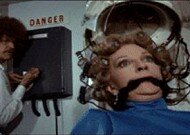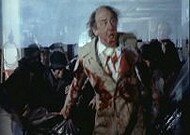Plot
Hammy but dedicated Shakesperean actor Edward Lionheart, wrongly thought to be dead, kills off the critics who mercilessly trashed his every heartfelt performance, taking inspiration in his dark deeds from The Bard himself.
Analysis
It's all about Vincent Price, this film is like a valentine to the great man who never quite got the respect, or range of roles, he deserved, but who did just fine with what he was given. How many of you thought Price was British? That regal, commanding, mellifluous, cultured yet slightly menacing voice etc. He HAD to be British, right? Wrong, and this 1973 film was his first British horror film, and I would argue that by surrounding him with British personalities, the filmmakers were responding to this well-held belief. Price was also a cultured man who wrote several cookbooks- in "Theatre of Blood", he dons a chef's outfit at one pivotal moment. Coincidence? I doubt it.
And then there's the idea of the film. What inspired it? Could it possibly be Price's own enjoyable performances in films tht were hardly high-art that were often described as hammy performances? His typecasting in horror that started with the excellent "House of Wax"? Vincent Price was an excellent horror star who could do much more and "Theatre of Blood" allows him to do great theatrical work whilst still staying within the realms of horror, and without losing his sense of humour and tendency to ham it up the way we all know and love. In a sense, it is a complex film, a combination of surprisingly bloody (for a 1973 all-starrer) horror and comedy but then Vincent Price was hard to peg down himself. His voice alone rivalled Boris Karloff's in its ability to evoke terror and sympathy, though usually Price's characters seemed more willing to give in to their dark side, unlike Karloff and certainly unlike the wonderfully pitiful Lon Chaney Jr. You're not sure what to make of Edward Lionheart, he's fascinating because, although Price lends such depth and wounded pride to the part, at the end of the day, the critics, however pompous and mean, are mostly correct. He's a ham, albeit a ham who takes pride in his work. What does Lionheart care what some pompous windbag thinks of his performances anyway? A great deal, and understandably so. Then again, why am I taking an opposing view to the critics?
The behavior of the critics makes it a little easier to sympathise with Lionheart, but his eventual descent into commiting violent acts is harder to warm to. In the critic's corner we have assembled some of Britain's finest players of snobs and upper-class windbags. Getting more screen time here and thus greater opportunity to create a fully-realised character is Ian Hendry as the harshest of critics, yet with the most sensible justification. It pains him to see someone so bad at their profession. The same cannot be said for the rest, with Coral Browne looking stylishly snooty (a part that today would go to Maggie Smith, no doubt), Robert Coote and Harry Andrews playing two rather pathetic and weak men, and the great Robert Morley who plays the appropriately named Meredith Merridew, a pompous, effete windbag.
Diana Rigg provides some surprisingly tender moments as Lionheart's devoted daughter who acts as his accomplice under a (all-too obvious, but fun) male guise. She is one of the world's most underrated actresses- able to do Shakespeare, popular TV entertainment like "The Avengers", the sorely neglected Bond film "On Her Majesty's Secret Service", and even an Agatha Christie film. One should also look out for that most identifiable of Irish character players, Milo O'Shea, who has been in the definitive screen version of "Romeo and Juliet", "Barbarella" (one of my favourites, as the amusingly named Duran Duran), and even "The Verdict". Here he plays a rather silly cop, who is a tad slow to catch on.
But back to Price, just look at the way he is used in the film. There are several choice camera angles and (dare I say it) Priceless closeups of the great man in his various Shakesperean characters. Price's recitations are both spine-tingling and hilarious. It's a go-for-broke performance and at one point the director has Price donning a suave cape that has him looking like Dracula whilst he rabbits on about his hurt feelings and commits suicide, meanwhile the critics are either laughing, egging him on, or looking entirely disinterested. A bravura moment.
Then there's the murders. It's true that the film is quite similar in plot to Price's low-budget chiller "The Abominable Dr. Phibes" but the fine cast was not quite as superlative as here and the murders were not quite so gruesome or macabre. The fact that Price's character takes his wicked inspiration from The Bard makes the film look as if it were written by Niles and Frasier Crane. Price apparently abhored screen violence but found this to be one of his favourite roles in his later stages. Could it be because it was an early criticism of the 'People Don't Kill People, Horror Movies With Sarcastic Killer Dolls Kill People' school of thinking, still prescient today? Price is clearly having fun in, in one scene he is dressed in an afro as a gay hairdresser who electrocutes Coral Browne. Browne of course, would soon be Mrs. Vincent Price, in a macabre twist. Just hearing Price say Dishy, Dishy hair!' cracks me up and the murder indeed is 'shocking'. The moral is, that if one bans every film or every piece of literature one must also look at the classics, as Shakespeare was a very sick puppy.
It's startling to see the wonderful Harry Andrews, the unforgettable rigid Sgt. Major in "The Hill" playing a skirt chaser here, but he also brilliantly played a gay man in "Entertaining Mr. Sloane". His character gets his hear cut out in a cheap-looking but bloody moment in the film. But for me, the two I remember most here are Arthur Lowe and Robert Morley. Lowe plays the aptly named Horace Sprout who has his head cut off in his sleep, with Price portraying a doctor who has his brow wiped by Rigg, amusingly, and inevitably commands 'Scalpel!'. All the while, Lowe's wife is hilariously ignorant in her slumber, whilst some hysterically sweet music plays in the background. This might be a film all about Vincent Price but damn if Robert Morley doesn't come close to stealing it, decked out in purple making him look like a giant grape, or SOME kind of fruit. His effete and extraordinarily pompous Meredith Merridew has his death scene take inspiration from one of the Bard's most controversial works, Titus Andronicus. Needless to say that Morley loves his pet poodles whom he calls his 'babies'. Fans of that play or the atrocious and overrated Tony Hopkins film will have some idea of the startlingly nasty fate that awaits Mr. Morley. Also worth mentioning is Hendry and Price re-enacting one of my favourite scenes from Romeo and Juliet (no, not the balcony scene you perverts!).
Price has much fun doing Shakespeare, making for an imposing Julius Caesar, an unforgettable interpretation of King Lear (love the false nose, he looks like a cross between Beelzebub and Cyrano) and several others. Some might consider this a comedy, but I don't see it as any more of a comedy than "Child's Play" (which I love) or "Scream", but that's not to say that they aren't very funny films, but they are still horror. It's certainly not for Grandma.
| Key Area |
Rating (out of 5) |
Comment |
|
Action
|
|
Not an action film at all, considering it deals with Shakespeare and theatre critics.
|
|
Tension
|
|
Price is utterly chilling but also amusing, thus relieving much of the tension.
|
|
Violence/
Gore
|
|
It's very tame but still startling to see all of these people in a film like this, and much more violent than most of the horror films from Britain at the time.
|
|
Bare Flesh
|
None
|
What's that? You want to see Robert Morley naked? Aaaaarrrrrrgggghhhh! Never read one of my reviews ever again you sick, sick reader!
|
|
Plot
|
|
It may seem repetitive after a while but the central premise is still very clever indeed.
|
|
Verdict
Clever, bloody, scary and funny, with an unbeatable cast of pompous twits. But animal lovers best stay away!
|
|
 |
Facts, figures and boobs
|
1.
|
All of the actors had some stage appearance, with O'Shea even playing the Friar in the Zeffirelli version of "Romeo and Juliet" on screen. Rigg appeared in "King Lear" and "A Midsummer Night's Dream".
|
|
2.
|
Harry Andrews and Ian Hendry both appeared in "The Hill".
|
|
3.
|
Rigg later joined the TV series "Mystery" in 1989. Her precursor? Vincent Price.
|
|
Movie Pictures
(Click picture to enlarge)
|
|
|
 |
 |
|
|
 |
|
| What other people thought of this film: - |
| |
|
|





